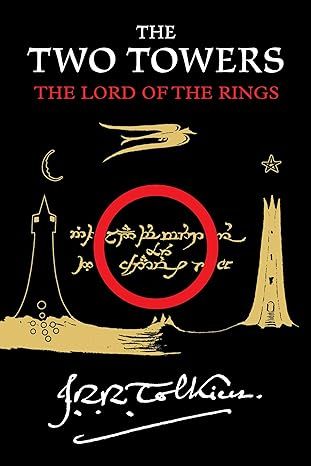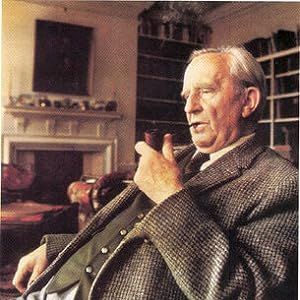The Two Towers: Being the Second Part of The Lord of the Rings (The Lord of the Rings, 2)
4.8
-
13,625 ratings
The Lord of the Rings saga continues in The Two Towers,the second volume in J.R.R. Tolkien's epic adventure.
One Ring to rule them all, One Ring to find them, One Ring to bring them all and in the darkness bind them.
Frodo and his Companions of the Ring have been beset by danger during their quest to prevent the Ruling Ring from falling into the hands of the Dark Lord by destroying it in the Cracks of Doom. They have lost the wizard, Gandalf, in a battle in the Mines of Moria. And Boromir, seduced by the power of the Ring, tried to seize it by force. While Frodo and Sam made their escape, the rest of the company was attacked by Orcs. Now they continue the journey alone down the great River Anduin—alone, that is, save for the mysterious creeping figure that follows wherever they go.
“Among the greatest works of imaginative fiction of the twentieth century. The book presents us with the richest profusion of new lands and creatures, from the beauty of Lothlórien to the horror of Mordor.”—Sunday Telegraph
Kindle
$12.99
Available instantly
Audiobook
$0.00
with membership trial
Hardcover
$35.00
Paperback
$12.54
Ships from
Amazon.com
Payment
Secure transaction
ISBN-10
0547928203
ISBN-13
978-0547928203
Print length
352 pages
Language
English
Publisher
William Morrow Paperbacks
Publication date
September 17, 2012
Dimensions
5.5 x 1 x 8.25 inches
Item weight
11.8 ounces
Frequently bought together
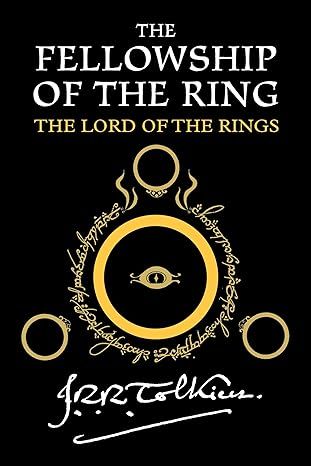
The Fellowship Of The Ring: Being the First Part of The Lord of the Rings (The Lord of the Rings, 1)
4.8
-
22,514
$12.08
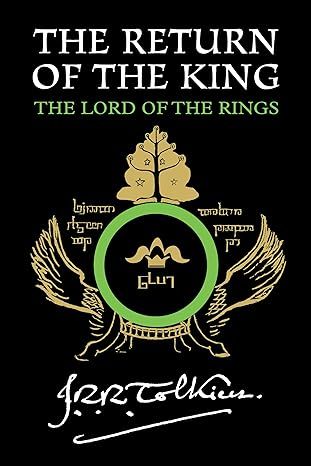
The Return of the King: Being the Third Part of the Lord of the Rings (The Lord of the Rings, 3)
4.9
-
10,910
$11.13
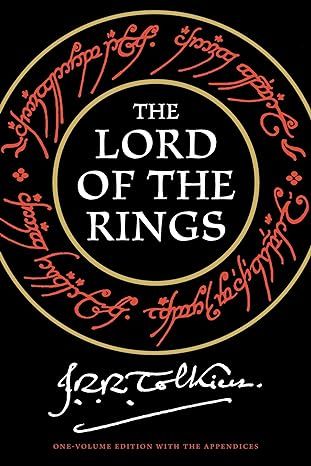
The Lord Of The Rings
4.8
-
3,795
$12.49
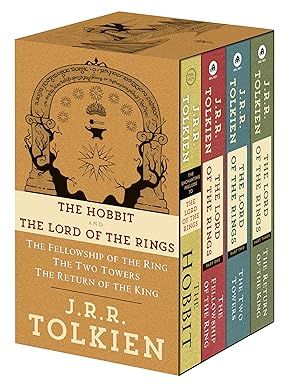
J.R.R. Tolkien 4-Book Boxed Set: The Hobbit and The Lord of the Rings
4.8
-
21,709
$20.77
Popular Highlights in this book
There are some things that it is better to begin than to refuse, even though the end may be dark.
Highlighted by 4,469 Kindle readers
Many that live deserve death. And some die that deserve life. Can you give that to them? Then be not too eager to deal out death in the name of justice, fearing for your own safety. Even the wise cannot see all ends.
Highlighted by 2,806 Kindle readers
One who cannot cast away a treasure at need is in fetters. You did rightly.
Highlighted by 2,418 Kindle readers
Perilous to us all are the devices of an art deeper than we possess ourselves.
Highlighted by 2,370 Kindle readers
Product details
ASIN :
B007978PKY
File size :
4036 KB
Text-to-speech :
Enabled
Screen reader :
Supported
Enhanced typesetting :
Enabled
X-Ray :
Enabled
Word wise :
Enabled
Editorial Reviews
“Among the greatest works of imaginative fiction of the twentieth century. The book presents us with the richest profusion of new lands and new creatures, from the beauty of Lothlorien to the horror of Mordor, adventures to hold us spell-bound, and words of beauty and evocation to bring all vividly before us.” — Sunday Telegraph (UK)
Sample
Chapter 1
The Departure of Boromir
Aragorn sped on up the hill. Every now and again he bent to the ground. Hobbits go light, and their footprints are not easy even for a Ranger to read, but not far from the top a spring crossed the path, and in the wet earth he saw what he was seeking.
‘I read the signs aright,’ he said to himself. ‘Frodo ran to the hill-top. I wonder what he saw there? But he returned by the same way, and went down the hill again.’
Aragorn hesitated. He desired to go to the high seat himself, hoping to see there something that would guide him in his perplexities; but time was pressing. Suddenly he leaped forward, and ran to the summit, across the great flag-stones, and up the steps. Then sitting in the high seat he looked out. But the sun seemed darkened, and the world dim and remote. He turned from the North back again to North, and saw nothing save the distant hills, unless it were that far away he could see again a great bird like an eagle high in the air, descending slowly in wide circles down towards the earth.
Even as he gazed his quick ears caught sounds in the woodlands below, on the west side of the River. He stiffened. There were cries, and among them, to his horror, he could distinguish the harsh voices of Orcs. Then suddenly with a deep-throated call a great horn blew, and the blasts of it smote the hills and echoed in the hollows, rising in a mighty shout above the roaring of the falls.
‘The horn of Boromir!’ he cried. ‘He is in need!’ He sprang down the steps and away, leaping down the path. ‘Alas! An ill fate is on me this day, and all that I do goes amiss. Where is Sam?’
As he ran the cries came louder, but fainter now and desperately the horn was blowing. Fierce and shrill rose the yells of the Orcs, and suddenly the horn-calls ceased. Aragorn raced down the last slope, but before he could reach the hill’s foot, the sounds died away; and as he turned to the left and ran towards them they retreated, until at last he could hear them no more. Drawing his bright sword and crying Elendil! Elendil! he crashed through the trees.
A mile, maybe, from Parth Galen in a little glade not far from the lake he found Boromir. He was sitting with his back to a great tree, as if he was resting. But Aragorn saw that he was pierced with many black-feathered arrows; his sword was still in his hand, but it was broken near the hilt; his horn cloven in two was at his side. Many Orcs lay slain, piled all about him and at his feet.
Aragorn knelt beside him. Boromir opened his eyes and strove to speak. At last slow words came. ‘I tried to take the Ring from Frodo,’ he said. ‘I am sorry. I have paid.’ His glance strayed to his fallen enemies; twenty at least lay there. ‘They have gone: the Halflings: the Orcs have taken them. I think they are not dead. Orcs bound them.’ He paused and his eyes closed wearily. After a moment he spoke again.
‘Farewell, Aragorn! Go to Minas Tirith and save my people! I have failed.’
‘No!’ said Aragorn, taking his hand and kissing his brow. ‘You have conquered. Few have gained such a victory. Be at peace! Minas Tirith shall not fall!’
Boromir smiled.
‘Which way did they go? Was Frodo there?’ said Aragorn.
But Boromir did not speak again.
‘Alas!’ said Aragorn. ‘Thus passes the heir of Denethor, Lord of the Tower of Guard! This is a bitter end. Now the Company is all in ruin. It is I that have failed. Vain was Gandalf’s trust in me. What shall I do now? Boromir has laid it on me to go to Minas Tirith, and my heart desires it; but where are the Ring and the Bearer? How shall I find them and save the Quest from disaster?’
He knelt for a while, bent with weeping, still clasping Boromir’s hand. So it was that Legolas and Gimli found him. They came from the western slopes of the hill, silently, creeping through the trees as if they were hunting. Gimli had his axe in hand, and Legolas his long knife: all his arrows were spent. When they came into the glade they halted in amazement; and then they stood a moment with heads bowed in grief, for it seemed to them plain what had happened.
‘Alas!’ said Legolas, coming to Aragorn’s side. ‘We have hunted and slain many Orcs in the woods, but we should have been of more use here. We came when we heard the horn – but too late, it seems. I fear you have taken deadly hurt.’
‘Boromir is dead,’ said Aragorn. ‘I am unscathed, for I was not here with him. He fell defending the hobbits, while I was away upon the hill.’
‘The hobbits!’ cried Gimli. ‘Where are they then? Where is Frodo?’
‘I do not know,’ answered Aragorn wearily. ‘Before he died Boromir told me that the Orcs had bound them; he did not think that they were dead. I sent him to follow Merry and Pippin; but I did not ask him if Frodo or Sam were with him: not until it was too late. All that I have done today has gone amiss. What is to be done now?’
‘First we must tend the fallen,’ said Legolas. ‘We cannot leave him lying like carrion among these foul Orcs.’
‘But we must be swift,’ said Gimli. ‘He would not wish us to linger. We must follow the Orcs, if there is hope that any of our Company are living prisoners.’ ‘But we do not know whether the Ring-bearer is with them or not,’ said Aragorn. ‘Are we to abandon him? Must we not seek him first? An evil choice is now before us!’
‘Then let us do first what we must do,’ said Legolas. ‘We have not the time or the tools to bury our comrade fitly, or to raise a mound over him. A cairn we might build.’
‘The labour would be hard and long: there are no stones that we could use nearer than the water-side,’ said Gimli.
‘Then let us lay him in a boat with his weapons, and the weapons of his vanquished foes,’ said Aragorn. ‘We will send him to the Falls of Rauros and give him to Anduin. The River of Gondor will take care at least that no evil creature dishonours his bones.’
Read more
About the authors
J. R. R. Tolkien
J.R.R. Tolkien was born on 3rd January 1892. After serving in the First World War, he became best known for The Hobbit and The Lord of the Rings, selling 150 million copies in more than 40 languages worldwide. Awarded the CBE and an honorary Doctorate of Letters from Oxford University, he died in 1973 at the age of 81.
Reviews
Customer reviews
4.8 out of 5
13,625 global ratings
Lucy
5
Classic
Reviewed in the United States on April 9, 2024
Verified Purchase
Great large size print! One of my all time favorite novels.
Michael T.
5
The Darkest of the Three...
Reviewed in the United States on January 31, 2024
Verified Purchase
"The Two Towers," the second book in J.R.R. Tolkien's legendary "The Lord of the Rings" series, is a five-star masterpiece that brilliantly weaves Christian themes into its rich tapestry. This novel isn't just a cornerstone of fantasy literature; it's a profound exploration of good versus evil, redemption, and faith, deeply rooted in Christian symbolism.
Tolkien's narrative skillfully depicts the struggle between light and darkness, a central theme mirroring the Christian fight against sin and for virtue. The resilience of characters like Frodo and Sam in their daunting quest reflects the Christian journey of steadfast faith in the face of trials. Their endurance, against all odds, serves as a poignant allegory for the triumph of good over evil through faith and unwavering resolve.
One of the most compelling aspects of "The Two Towers" is its exploration of redemption, particularly through characters like Gollum. His internal battle between his Sméagol and Gollum personas is a powerful representation of the Christian belief in redemption and the constant struggle between our better selves and our baser instincts. This theme resonates deeply, offering hope and a reminder of the potential for change, regardless of past transgressions.
Additionally, the theme of fellowship, with its emphasis on unity and mutual support, aligns closely with Christian values. The fellowship's journey, though fraught with challenges, highlights the strength found in community and togetherness, a message that is timeless and universally relevant.
In summary, "The Two Towers" is more than a high-fantasy epic. It's a narrative that intertwines adventure with profound spiritual and moral lessons, reflecting core aspects of the Christian faith. For readers seeking a story that combines exhilarating adventure with meaningful spiritual depth, "The Two Towers" is an unparalleled choice.
Read more
5 people found this helpful
Kindle Customer
5
The Masterwork of High Fanasy
Reviewed in the United States on March 26, 2024
Verified Purchase
All other works of fantasy since use this as source material. The greatest work of fiction of modern times. A true classic.
Her Royal Peepness Princess HoneyBunny Blayze
5
The Two Towers (Lord of The Rings)
Reviewed in the United States on May 30, 2023
Verified Purchase
The first copy of The Two Towers was a print edition belonging to my Grandmother and it's whole title at that time was The Two Towers Being the Second part of The Lord of the Rings and was broken into 2 parts. I don't know exactly know when it became know as it is today as Book 2 of the The Lord of the Rings trilogy. However the change confuses me as I am use to even the Omnibus being presented As J.R.R. Tolkien presented his work as a series.
It Begins right where The Fellowship of The Rings leaves off . As it is one of my favorite series that I read every year. I could accidentally say too much for someone who hasn't yet begun their own journey with The Hobbit There and Back again which I was taught to think of as a prequel. Therefore I won't say a lot only that this details The journey of The Ring forward. By both those on the side of good and ill.
There are new characters introduced in The Two Towers. My favorite of these since childhood is Treebeard of the Ent. My grandmother made me a Treebeard bookmark so I could easily read those pages on my own from about 8 on. While other parts were still a bit daunting for me to read on my own. So we read those together until I was approximately 11. As a dyslexic reading wasn't a automatic love for me. Assigned books weren't really a draw they were a chore. J.R.R. Tolkien work however was different. I wanted to accomplish it so, it's largely why I learned and got through books like Blubber and Ralph and the motorcycle. With the right incentives.
I would highly recommend this book to others, along with rating of higher if I could.
Read more
3 people found this helpful
Books and Cafes Blog
4
A strong sequel - faster paced and more engaging than it's predecessor
Reviewed in the United States on August 23, 2021
Verified Purchase
(Warning: Plenty of spoilers ahead)
Another classic tackled. After reading The Fellowship of the Ring, I didn’t think I’d stick with this series despite its indelible mark on the fantasy genre and literature in general. I found The Fellowship unnecessarily long, slow-moving, and incredibly hard to get through. At the end of each chapter, I felt frustrated with how little had happened.
But then, days and weeks after I finished, I kept thinking about the characters and their journey. I stand by my initial critiques — too much world-building (see: way too many names of things and people) + poor pacing (see: the first three chapters — the movie does this better) — but I was still curious about the goings-on of Middle-earth and could begrudgingly admit the journey is the destination, or however that quote goes.
So I ordered The Two Towers, thinking I’d probably do better with a physical copy over an ebook. I can confirm this was the right move. I can also confirm the second book moves along much more quickly than the first with plenty of exciting plot points. That said, I drastically preferred the first half (Book Three) over the second (Book Four). Book Three picks up with the fellowship companions that Frodo and Sam abandoned at the end of The Fellowship of the Ring while Book Four again resumes the journey with Frodo and Sam.
What I’ve come to realize is that I don’t like Frodo. Fair warning, many spoilers ahead.
Hear me out! Literally everyone else is so much more interesting (yeah, yeah, that’s probably the point or something). I know Gandalf is always saying Aragorn is the best tracker ever, but this book really proves it. Aragorn’s like, “See that single broken blade of grass in a huge trampled field? Yeah, the Orcs went that way and they carried two hobbits.” I mean, this guy could actually find a needle in a haystack. And he’s a talented composer of songs and poems alike?! Is there anything he can’t do???
Meanwhile, Legolas and Gimli SHINE. Legolas already served as my primary source of comedic relief with his prancing all over snow mounds and confusion with the slow progress of his group. The bromance between the Elf and Dwarf takes flight, culminating in the battle at Helm’s Deep, where every time they find each other again, they compare kill counts (a little dark, sure) and support one another like no one’s business. And anytime another character’s prejudice keeps them from inviting Gimli to their homes, Legolas is like, “Oh, nuh-uh. I’m not coming without my brave FRIEND, Gimli, for whom I would DIE.” I live for it.
Plus, y’know, Gandalf is resurrected (or never died?) so that’s kind of a big deal. Although he’s still hoarding secrets and off doing who-knows-what most of the time, hand-waving his aliveness away with vague explanations. How can an author be so verbose when describing every hill, hole, and river in any five-mile radius and yet leave the twist of a Wizard’s non-death to the imagination?
So yeah, Book Three — I’m here for it. This is the story I want to read. It’s most interesting when all the different characters are playing off each other. Then we get to Book Four, which has drastically fewer characters and, for the most part, straight traveling. It reminds me of my least favorite parts of Harry Potter and the Deathly Hallows. Honestly, traveling isn’t actually so bad, but we got so much of it in Books One and Two.
Let’s get to the root of my problems. First, I tend to get lost in Tolkien’s long descriptions. Second, I’m so tired of being told that Frodo is kind and pure and perfect. He acts fairly entitled and superior with Sam — who admittedly leans into the servant role — content to boss Sam around, criticize him (see: knot-tying), and never truly listen to his suggestions or concerns. Oddly, Frodo seems to have way more empathy for Smeagol than he does for long-time friend Sam, probably because he wants to look good to Gandalf. Meanwhile, Sam is literally out here sacrificing his life for Frodo but whatevs.
The last two chapters in particular drag. The fight scene with the spider feels drawn out, Frodo’s capture even more so. Why do we have to sit through so much unimportant Orc dialogue just to learn Frodo lives but they’re going to lock him up? I’m ranting now.
I wish Books Three and Four had been combined and the chapters alternated between both groups of characters — that would’ve kept the story moving. And I wish there were more (read: any) prominent female characters. Tolkien can introduce beings and societies like the Ents, but not strong female characters? We even get a quasi-explanation for the lack of female Ents and, y’all, buckle in. The Entwives and Entmaidens are missing. The men left them alone for a bit and now they’re gone. Just gone. Please tell me we pick this thread back up in the next book because what?!
Like, this is an extensive fantasy world and we can have entirely male populations (see: Orcs), but not any entirely non-male groups? I mean, Eowyn is introduced and she even gets to hold a position of power, but she’s there and gone again in the blink of an eye. Fingers-crossed we see her again. I’ll even take Galadriel again in all her beauty = perfection glory.
Sorry, look at me, ranting again. I did actually like this book, I swear! The prose is lyrical and timeless. The included poems and songs hit all the right notes. Boromir’s farewell is heart wrenching, affecting each of the characters in different yet profound ways. And we get to meet Faramir, who I found to be an absolute baller — decisive and intimidating, yet genuine and kind. Standout moments are meeting the Ents, the battle at Helm’s Deep, and Sam’s fumble in the end zone with Faramir. Oh also Smeagol is surprisingly sympathetic? Like I get where Frodo is coming from, but c’mon, just please also send a little of that understanding Sam’s way. He’s way less annoying than Pippin, at the very least!
So if like me, you finished the first book in the series and aren’t sure if you want to keep going, I’d recommend sticking with it! This is a series that only keeps getting better.
Read more
9 people found this helpful
Top J. R. R. Tolkien titles

The Return of the King: Being the Third Part of the Lord of the Rings (The Lord of the Rings, 3)
4.9
-
10,910
$11.13

The Fellowship Of The Ring: Being the First Part of The Lord of the Rings (The Lord of the Rings, 1)
4.8
-
22,514
$12.08

J.R.R. Tolkien 4-Book Boxed Set: The Hobbit and The Lord of the Rings
4.8
-
21,709
$20.77

The Lord Of The Rings
4.8
-
3,795
$12.49
Best Sellers

The Great Alone: A Novel
4.6
-
152,447
$5.49

The Four Winds
4.6
-
156,242
$9.99

Winter Garden
4.6
-
72,838
$7.37

The Nightingale: A Novel
4.7
-
309,637
$8.61

Steve Jobs
4.7
-
24,596
$1.78

Iron Flame (The Empyrean, 2)
4.6
-
164,732
$14.99

A Court of Thorns and Roses Paperback Box Set (5 books) (A Court of Thorns and Roses, 9)
4.8
-
26,559
$37.99

Pretty Girls: A Novel
4.3
-
88,539
$3.67

The Bad Weather Friend
4.1
-
34,750
$12.78

Pucking Around: A Why Choose Hockey Romance (Jacksonville Rays Hockey)
4.3
-
41,599
$14.84

Start with Why: How Great Leaders Inspire Everyone to Take Action
4.6
-
37,152
$9.99

Tomorrow, and Tomorrow, and Tomorrow: A novel
4.4
-
95,875
$13.99

Weyward: A Novel
4.4
-
27,652
$11.99

Tom Lake: A Reese's Book Club Pick
4.3
-
37,302
$15.74

All the Sinners Bleed: A Novel
4.4
-
12,894
$13.55

The Mystery Guest: A Maid Novel (Molly the Maid)
4.3
-
9,844
$14.99

Bright Young Women: A Novel
4.2
-
8,485
$14.99

The Wager: A Tale of Shipwreck, Mutiny and Murder (Random House Large Print)
4.5
-
28,672
$14.99

Hello Beautiful (Oprah's Book Club): A Novel (Random House Large Print)
4.4
-
79,390
$14.99

Small Mercies: A Detective Mystery
4.5
-
16,923
$10.00

Holly
4.5
-
31,521
$14.99

The Covenant of Water (Oprah's Book Club)
4.6
-
69,712
$9.24

Wellness: A novel
4.1
-
3,708
$14.99

The Art Thief: A True Story of Love, Crime, and a Dangerous Obsession
4.3
-
4,805
$14.99

The Berry Pickers: A Novel
4.5
-
14,209
$14.99

Elon Musk
4.7
-
15,272
$16.99
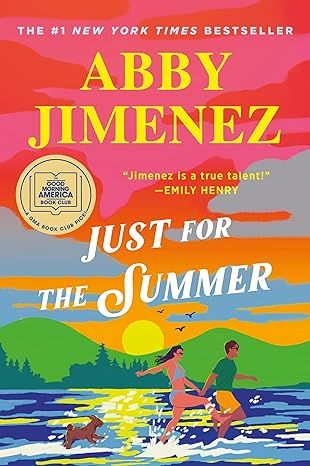
Just for the Summer
4.6
-
19,524
$11.99
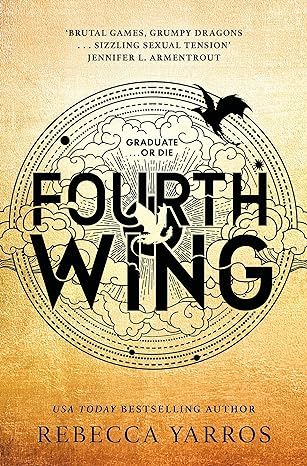
Fourth Wing (International Edition)
4.8
-
206,495
$7.95
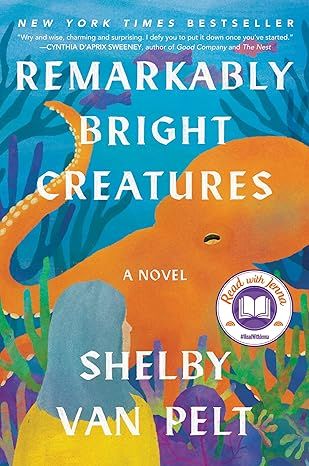
Remarkably Bright Creatures: A Read with Jenna Pick
4.6
-
65,556
$15.80

Tell Me Your Life Story, Mom: A Mother’s Guided Journal and Memory Keepsake Book (Tell Me Your Life Story® Series Books)
4.7
-
5,107
$11.24
